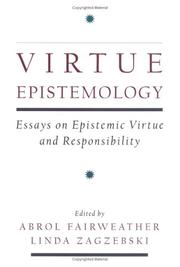| Listing 1 - 2 of 2 |
Sort by
|
Book
ISBN: 1139698923 1139861948 1139860852 1139236342 1139870866 1139865137 1139868713 1139863010 1107028574 1316642836 9781316642832 9781139865135 9781139863018 9781139870863 9781139236348 9781107028579 Year: 2014 Publisher: Cambridge : Cambridge University Press,
Abstract | Keywords | Export | Availability | Bookmark
 Loading...
Loading...Choose an application
- Reference Manager
- EndNote
- RefWorks (Direct export to RefWorks)
An epistemic virtue is a personal quality conducive to the discovery of truth, the avoidance of error, or some other intellectually valuable goal. Current work in epistemology is increasingly value-driven, but this volume presents the first collection of essays to explore whether virtue epistemology can also be naturalistic, in the philosophical definition meaning 'methodologically continuous with science'. The essays examine the empirical research in psychology on cognitive abilities and personal dispositions, meta-epistemic semantic accounts of virtue theoretic norms, the role of emotion in knowledge, 'ought-implies can' constraints, empirically and metaphysically grounded accounts of 'proper functioning', and even applied virtue epistemology in relation to education. Naturalizing Epistemic Virtue addresses many core issues in contemporary epistemology, presents new opportunities for work on epistemic abilities, epistemic virtues and cognitive character, and will be of great interest to those studying virtue ethics and epistemology.
Virtue epistemology. --- Naturalism. --- Materialism --- Mechanism (Philosophy) --- Philosophy --- Positivism --- Science --- Epistemic virtue --- Epistemology, Virtue --- Knowledge, Theory of --- Virtue epistemology --- Naturalism

ISBN: 1280481501 0195343891 1423762150 9781423762157 9786610481507 6610481504 019514077X 9780195140774 0197731937 0190286350 Year: 2001 Publisher: New York: Oxford university press,
Abstract | Keywords | Export | Availability | Bookmark
 Loading...
Loading...Choose an application
- Reference Manager
- EndNote
- RefWorks (Direct export to RefWorks)
Virtue epistemology is an exciting, new movement receiving an enormous amount of attention from top epistemologists and ethicists ; this pioneering volume reflects the best work in that vein. Featuring superb writing from contemporary American philosophers, it includes thirteen never before published essays that focus on the place of the concept of virtue in epistemology. For the last few years, philosophers have been debating how this concept functions in definitions of knowledge. They question the extent to which knowledge is both normative (i.e., with a moral component) and non-normative, and many of them dispute the focus on justification, which has proven to be too restrictive. Epistemologists are searching for a way to combine the traditional concepts of ethical theory with epistemic concepts ; the result is a new approach called virtue epistemology - one that has established itself as a particularly favorable alternative. Containing the fruits of recent study on virtue epistemology, this volume offers a superb selection of contributors - including Robert Audi, Simon Blackburn, Richard Foley, Alvin Goldman, Hilary Kornblith, Keith Lehrer, Ernest Sosa, and Linda Zagzebski - whose work brings epistemology into dialogue with everyday issues.
Virtue epistemology. --- Ethics. --- Deontology --- Ethics, Primitive --- Ethology --- Moral philosophy --- Morality --- Morals --- Philosophy, Moral --- Science, Moral --- Philosophy --- Values --- Epistemic virtue --- Epistemology, Virtue --- Knowledge, Theory of --- Virtue epistemology --- Cognitive psychology --- General ethics --- Virtue. --- Duty. --- Knowledge, Theory of.
| Listing 1 - 2 of 2 |
Sort by
|

 Search
Search Feedback
Feedback About UniCat
About UniCat  Help
Help News
News